
The copper-rumped hummingbird is a species of hummingbird in the "emeralds", tribe Trochilini of subfamily Trochilinae. It is found in Tobago, Trinidad, Venezuela, and possibly Grenada.

The red-crowned woodpecker is a species of bird in the subfamily Picinae of the woodpecker family Picidae. It is found in Costa Rica, Panama, Colombia, Venezuela, Guyana, Suriname, and Tobago.

The golden-olive woodpecker is a species of bird in subfamily Picinae of the woodpecker family Picidae. It is found from Mexico south and east through Panama, in every mainland South American country except Chile, Paraguay, and Uruguay, and in Trinidad and Tobago.
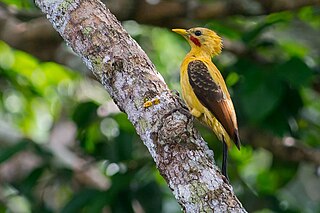
The cream-colored woodpecker is a species of bird in subfamily Picinae of the woodpecker family Picidae. It is found in every mainland South American country except Argentina, Chile, Paraguay, and Uruguay.

The checkered woodpecker is a species of bird in subfamily Picinae of the woodpecker family Picidae. It is found in Argentina, Bolivia, Brazil, Paraguay, and Uruguay.

The plain xenops is a passerine bird in the Furnariinae subfamily of the ovenbird family Furnariidae. It is found in the tropical New World from southern Mexico south as far as northern Bolivia and east across Brazil.
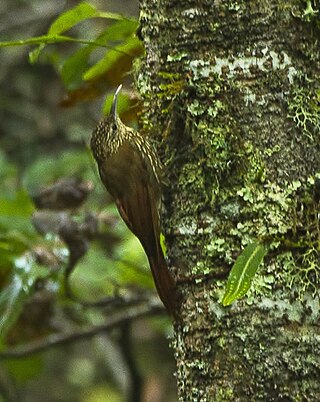
The spot-crowned woodcreeper, is a passerine bird in the subfamily Dendrocolaptinae of the ovenbird family Furnariidae. it is found in Middle America from Mexico to Panama.
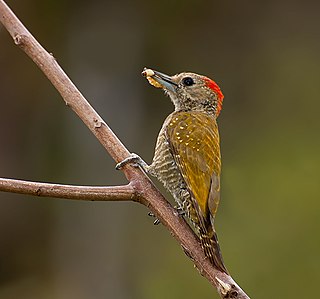
The little woodpecker is a species of bird in subfamily Picinae of the woodpecker family Picidae. It is found in every mainland South American country except Chile, Suriname, and Uruguay.
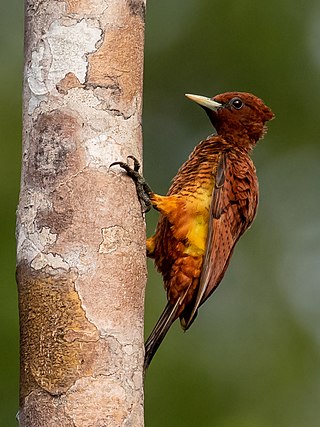
The scaly-breasted woodpecker, also known as the scale-breasted woodpecker, is a subspecies of bird in subfamily Picinae of the woodpecker family Picidae. Some taxonomists consider it a separate species. It is found in Bolivia, Brazil, Colombia, Ecuador, Peru, and Venezuela.

The waved woodpecker is a species of bird in subfamily Picinae of the woodpecker family Picidae. It is found in Bolivia, Brazil, Colombia, Ecuador, French Guiana, Guyana, Peru, Suriname, and Venezuela.
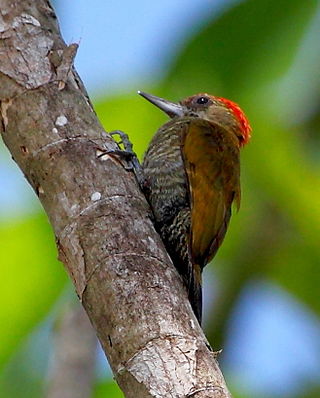
The red-stained woodpecker is a species of bird in subfamily Picinae of the woodpecker family Picidae. It is found in Bolivia, Brazil, Colombia, Ecuador, Peru, and Venezuela.

The scarlet-backed woodpecker is a species of bird in subfamily Picinae of the woodpecker family Picidae. It is found in Colombia, Ecuador and Peru.
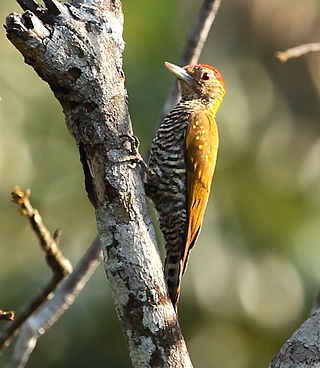
The golden-collared woodpecker is a species of bird in subfamily Picinae of the woodpecker family Picidae. It is found in Brazil, the Guianas, and Venezuela.

The Choco woodpecker is a Near Threatened species of bird in subfamily Picinae of the woodpecker family Picidae. It is found in Colombia and Ecuador.

The yellow-vented woodpecker is a species of bird in subfamily Picinae of the woodpecker family Picidae. It is found in Colombia, Ecuador, Peru, and Venezuela.

The dot-fronted woodpecker is a species of bird in subfamily Picinae of the woodpecker family Picidae. It is found in Argentina and Bolivia.

The smoky-brown woodpecker is a species of bird in subfamily Picinae of the woodpecker family Picidae. It is found in Argentina, Belize, Bolivia, Colombia, Costa Rica, Ecuador, El Salvador, Guatemala, Honduras, Mexico, Nicaragua, Panama, Peru, and Venezuela.

The yellow-eared woodpecker is a species of bird in subfamily Picinae of the woodpecker family Picidae. It is endemic to eastern Brazil.

The bar-bellied woodpecker is a species of bird in subfamily Picinae of the woodpecker family Picidae. It is found in Bolivia, Colombia, Ecuador, and Peru.

The blood-colored woodpecker is a species of bird in subfamily Picinae of the woodpecker family Picidae. It is found in Guyana and Suriname.























